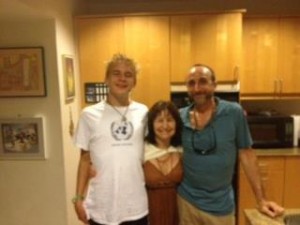“There is this myth that children with autism don’t have empathy. I’ve found the exact opposite to be true: children with autism are instead the most highly sensitive individuals I have ever had the privilege to know,” Elaine Hall
When traditional therapies didn’t help my son Neal, who was adopted from a Russian orphanage at two years old and diagnosed with autism at three, I sought out creative people: actors, writers, artists, and musicians, to work with him. Ten hours a day, seven days a week we followed Neal’s lead, connected to him on his terms. We joined his world.
When Neal stared intensely at his hand, we stared at ours. When Neal pounded the floor, we brought out drums and pounded with him. When Neal spun in a circle, we spun with him, round and round for as long as he wanted, until we were all laughing, connecting, daring, relishing our special haven, and our own, unique version of Ring Around the Rosie.
This led to days and experiences that were novel, magical, amazing. Bit by bit, Neal relinquished his solitary world. Gradually, the miracle happened and he merged into another world: Ours.
What worked for Neal has worked with hundreds of children through The Miracle Project, a theater arts program for children with autism and other special needs. I grew this program through the collective efforts of creative people who managed to connect with children on the autism spectrum. The premise is that, by joining a child’s world without judgment, we form relationships. Through relationships, children can develop everything they need: they can learn to engage with others, communicate with gestures, use ideas creatively, think and reflect.
Why creative people? Simple. Creative types don’t need to learn how to think outside the box. Like those with autism, we often don’t even know there is a box! Artists are, by nature, non-conformists. What can be more non-conforming than autism?
I’ve learned so much from Neal and others on the spectrum. I know now how to experience the world with a heightened sensitivity that allows me to appreciate Creation in such a profound way. Simple tasks can take on an almost spiritual quality. For example, there was a time when I tried to go on a walk with Neal and he insisted that we stop at every single hubcap attached to every single car on every street. I used to say, “Come on, let’s go.” And we’d battle.

One day, I stopped with him, knelt down, and stared at the hubcaps, and I saw the most beautiful thing: the sun falling on a hubcap creates a kaleidoscope of brilliant, shining shards of light. They are magical! After that day, Neal never needed to stop and look at hubcaps again, though I sometimes asked if we could.
There is this myth that children with autism don’t have empathy. I’ve found the exact opposite to be true: children with autism are instead the most highly sensitive individuals I have ever had the privilege to know. They simply express themselves differently. If Neal likes you, he may smell your hair. If he finds you to be insincere, he will walk away or throw something.
Yes, there are the difficult challenges of autism: the tantrums, the delays, the stimming, perseverating, and other frustrations. I don’t want to minimize these, yet if we dare look at all behavior as communication, we can see these actions as different forms of communicating. Perhaps the world is too loud, too fast, too toxic and it’s the so-called typical folk who need to take a step back and reflect on what we’re doing and how much we may be missing in our world. Perhaps our children with autism are here to teach us to look at the world with a different set of eyes; a new perspective. I’ve found such immeasurable joy, love, and value in the pure and simple creative connection I have with Neal and others like him.
They say it takes a village to raise a child. I think it takes a child with autism or other special needs to raise the consciousness of a village.
From “The Art of Autism: Shifting Perceptions, Debra Hosseini, page 128. Buy it here!
Elaine Hall is the founder of The Miracle Project profiled in AUTISM: The Musical. She is the author of Now I See the Moon (Harper Collins 2010) and coauthor with Diane Issacs of Seven Keys to Unlock Autism: Creating Miracles in the Classroom (Wiley 2011).
Editor’s note: Since this was first published I’ve had the privelege to become acquainted with Neal, Elaine’s son. He is mostly nonverbal and uses an IPAD to communicate. He is profound in his communications. Read Neal’s commmunication here.



